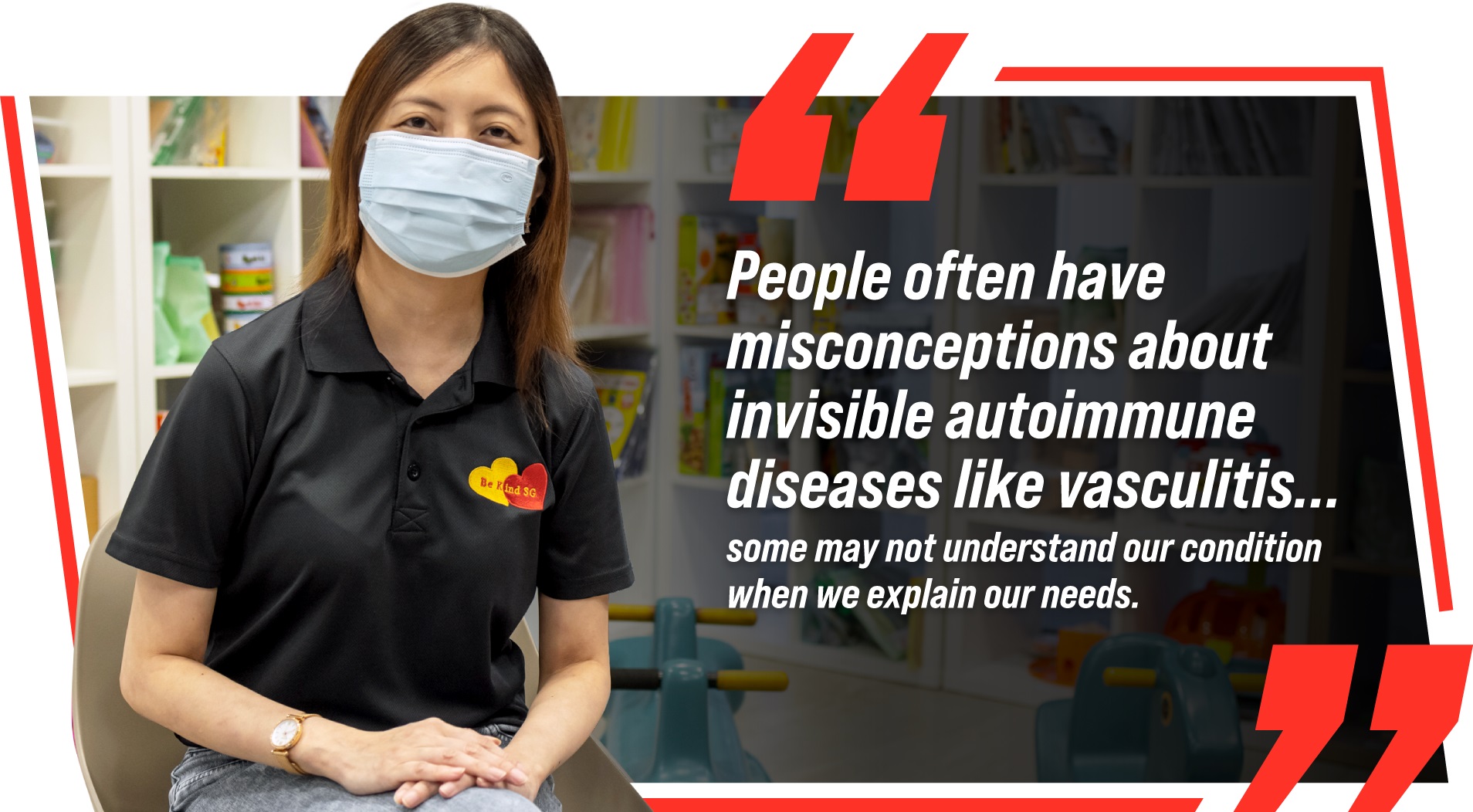Meet the Singaporean - Sherry Soon
15 September 2022

Can you tell us how it’s like living with vasculitis?
Vasculitis is a medical condition that causes an inflammation of the blood vessels. One of the challenges of living with this condition is that it’s incredibly disruptive to your life. During my 20s and 30s, I would get flare-ups that were triggered by stress which became more serious over time. In the beginning, the flare-ups would begin with many red spots on my legs. Slowly, it developed into ulcers. Skin on my feet and legs would start to break down leading to ulcers. The more I walked, the more the ulcers would get inflamed and I would then have to stop all activity and lie down. It took me some time to learn to live with this by spreading out my physical activities and planning regular breaks for myself.
People often have misconceptions about invisible autoimmune diseases like vasculitis being curable. We look like a typical healthy person, and people presume we can do everything. Some people still may not understand our condition when we try to explain our needs.
Was there an incident when your medical condition severely disrupted your plans?
I remember when I was on a vacation in Japan with a friend in 2014, a cyclist rode too closely past me on the street. The end of my scarf caught onto the cyclist’s bike and I fell heavily on the right side of my body. I only realised a few hours later that my injury was more serious than I thought.
At the hospital in Kyoto, an X-ray revealed that I had a broken hip. I was rushed into an emergency operation and had to be warded for a month to recuperate. Who would have thought that a vacation to Japan would have resulted in 3 screws in my hip now.

(Photo by PLUS Collaboratives)
What inspired you to start Autoimmune Diseases Singapore and Be Kind SG?
I first started Autoimmune Diseases Singapore because at the time, there was no support group for people like myself, who are dealing with an invisible autoimmune disease that isn’t immediately noticeable to others.
We organise community projects and share stories of how our members suffering with autoimmune diseases cope with their conditions. We also run activities like art workshops, kite flying and sharing sessions from medical professionals and social workers. At the heart of it all, we want to let those who suffer from the condition know that they are not alone in their journey.
One thing led to another and I started Be Kind SG with a similar purpose to provide support to other vulnerable groups. As a learning specialist with SHINE Children and Youth Services, I worked with children with special needs like those with autism spectrum disorder. People with special needs sometimes have conditions that are not outwardly obvious. I empathised with that and thought I could do more for these groups of people.
Could you share more about what Be Kind SG does?
At Be Kind SG, our primary focus is on disabilities like intellectual disabilities and autism. We support parents with children with special needs who are enrolled in special education schools. We initiated a pilot project called Play.Able, a play and toy library to create a safe space for children with special needs to play in.
We also occasionally hold kindness projects to show kindness to the special needs communities like giving small tokens of appreciation to the staff at adult disability and destitute homes during Nurses’ Day or to mothers of children with special needs during Mother’s Day.
Currently, we have 100 regular volunteers in Be Kind SG and 380 members in Autoimmune Diseases Singapore.

(Photo by PLUS Collaboratives)
What would you say to people who are hesitant about volunteering?
Due to my medical condition, I try to avoid volunteer activities that are too physically demanding for an extended period of time or I try to focus on helping out in other ways.
For those thinking of volunteering, my advice is: Start off small and volunteer once and see if you resonate with the organisation’s cause. If you do, make a regular commitment to it. I believe any form of volunteerism is great, no matter how big or small. The act of helping others will enrich you.
What did you gain as a volunteer?
Some of the most rewarding experiences are the friendships and relationships I’ve gained, and the lessons I’ve learnt from them. During the outbreak of COVID-19, we weren’t able to volunteer in-person at the destitute homes. A year later, I went back to the home that we used to visit regularly and was touched that a resident Ah-Ma still recognised me. I was so moved that she still remembered who I was even after a whole year of being apart.
- Sherry Soon, 41, Founder of Autoimmune Diseases Singapore and Be Kind SG
